South Sudan
June 21: Virus outbreak could spin ‘out of control’ in South Sudan
The pandemic is now accelerating in Africa, the World Health Organization says. While the continent had more time than Europe and the United States to prepare before its first case was confirmed on Feb. 14, experts feared many of its health systems would eventually become overwhelmed.
South Sudan, a nation with more military generals than doctors, never had a fighting chance. Five years of civil war and corruption stripped away much of its health system, and today nongovernmental organizations provide the majority of care. Nearly half of the population was hungry before the pandemic. Deadly insecurity continues, and a locust outbreak arrived just weeks before the virus.
When world leaders talk about the pandemic not being over until it’s over everywhere, they are talking about places like South Sudan.
The United Nations says the country’s outbreak is growing rapidly, with nearly 1,900 cases, including more than 50 health workers infected, more than 30 deaths and no way to know the true number of infections.
At one point several members of the COVID-19 task force tested positive, including Vice President Riek Machar.
.embed-container { position: relative; padding-bottom: 56.25%; height: 0; overflow: hidden; max-width: 100%; } .embed-container iframe, .embed-container object, .embed-container embed { position: absolute; top: 0; left: 0; width: 100%; height: 100%; }
“It can be out of control at any time,” said David Gai Zakayo, a doctor with the aid group Action Against Hunger.
“The groups we are treating are malnourished,” Zakayo said. “My big worry is if the virus begins spreading to those groups we are treating, it will be a disaster.”
At South Sudan’s only laboratory that tests for the virus, supervisor Simon Deng Nyichar said the team of 16 works up to 16-hour days slogging through a backlog of more than 5,000 tests. Around 9,000 samples have been tested since early April, when the country became one of the last in Africa to confirm a coronavirus case.
With materials in short supply, testing is largely limited to people with symptoms of COVID-19. It can take weeks to receive results, “creating mistrust in communities and resentment toward contact tracers,” the Health Ministry said last week.
Three lab workers have been infected and recovered, Nyichar told the AP. “This is the nature of our work. We are not scared of the disease.”
With the long hours, they work in pairs to stay sharp. “It’s a must for everybody to have a buddy as a helper to monitor all the steps on the dos and don’ts, otherwise we would have infected all of us,” he said.
While they’re aware of the dangers, South Sudan’s population at large still takes convincing.
The government’s loosening of lockdown measures last month was “perceived as an indication that the disease is not in South Sudan,” the Health Ministry said. Bars, restaurants and shops are open after people said they feared hunger more than the disease.
Some people have died waiting for rapid-response teams to arrive, the ministry said. And this month it stopped issuing “COVID-19 negativity certificates,” citing the peddling of fake ones — especially around Juba International Airport.
Meanwhile the virus has spread into more rural areas, including one of the United Nations-run camps upcountry where more than 150,000 civilians still shelter after South Sudan’s civil war ended in 2018.
There’s been an increase in deaths related to respiratory tract infections at that camp in Bentiu, WHO official Wamala Joseph told reporters last week, though it’s not clear whether they were from the virus. Testing is difficult as all samples must be flown to the capital. “This is a very vulnerable population,” he said.
Three of the six camps have no virus screening at the gate, according to a U.N. migration agency document dated this month. One camp has no facility to isolate the sick, and another will only have one when a generator is installed. Listed under preventative measures for the two camps in Juba, home to 30,000 people: “Face masks to be distributed in coming weeks.”
Meanwhile “our hospitals are full,” Wolde-Gabriel Saugeron, who leads the International Committee of the Red Cross’ team in Bor, wrote last week. “COVID-19 means that we need to create more space between our hospital beds, which has reduced the number of people we can accommodate in our wards by 30%.”
The pandemic is also worsening what was already a major problem in South Sudan: hunger. Most border crossings are closed, and food prices in the markets have shot up. Now the rainy season has started, making transport and storage more difficult.
.embed-container { position: relative; padding-bottom: 56.25%; height: 0; overflow: hidden; max-width: 100%; } .embed-container iframe, .embed-container object, .embed-container embed { position: absolute; top: 0; left: 0; width: 100%; height: 100%; }
More than 1.5 million people in South Sudan are newly vulnerable, including the urban poor who had not been receiving aid before, the U.N. humanitarian agency said last week.
“I cannot be saying famine, but I can say COVID-19 will worsen the situation,” said Kawa Tong, health and nutrition manager for the aid group CARE.
She knows the country already faced a long and winding path to emerge from multiple crises, starting with progress on the peace agreement that ended the civil war. Security would need to improve, people would find the confidence to return to their homes and begin cultivating their crops, and hunger would fall.
But now, of course, there’s the pandemic, and Tong has no idea when or how it will end. “People are overwhelmed,” she said. “People are scared.”
AP report
May 20: President writes to VP
President Salva Kiir has officially written to his first Vice-President Riek Machar after reports emerged that he had been infected with COVID-19.
The May 20 letter read in part: “It is my hope and prayer that each new day brings Your Excellency and the rest of our comrades closer to a full and speedy recovery.
“I want to personally encourage you and the rest of our colleagues to go through this with courage and zeal needed to win the battle. We know that the pandemic is relentless but we will pull through,” it added.
#SouthSudan’s President Salva Kiir writes a get well soon letter to his Vice President Riek Machar, Defence Minister and other members of the country’s former high level #Covid19 task force who tested positive for #Covid19. pic.twitter.com/OLBnhP1lKa
— Rachael Akidi (@rakidi) May 21, 2020
Kiir applauded Machar for opting to go into self-quarantine. He was infected along with his wife Angelina Teny who is also defense minister. A number of aides also tested positive.
“Take good time to rest and fight off this disease naturally. You will be in my daily prayers,” the statement concluded.
May 18 : South Sudan VP, Defense Minister infected
South Sudan’s Vice President Riek Machar has contracted coronavirus, his office confirmed on Monday, May 18. He is the vice-chairperson of the COVID-19 Task Force in the country.
His wife Angelina Teny, who serves as defence minister, “a number of his office staff and bodyguards” also tested positive for the virus, the office further disclosed.
Machar later stated on state television that he would be in self-isolation for 14 days in his residence.
Since recording index case on April 4, the country so far has recorded 347 cases of coronavirus, four recoveries and six deaths, privately-run Eye Radio reported.
The discovery last week of two COVID-19 cases in a crowded camp outside the capital Juba, raised concerns among humanitarian groups of the possible devastating effect on the settlement.
“We are particularly concerned that there have been a couple of cases that tested positive in the camp here just outside Juba. There are tens of thousands of internally displaced persons living there, so they live in quite cramped conditions,” James Reynolds, from the International Committee of the Red Cross in South Sudan, said in a statement.
April 1 : Virus-free South Sudan reports paltry tests
South Sudan, one of five virus-free African countries, says it has carried out 18 tests for the COVID-19 since the outbreak of the pandemic.
A March 31, 2020 statement from the office of the first vice-president confirmed that the country had no case of coronavirus. The same day that Burundi confirmed an index case leaving South Sudan as the only East African country uninfected.
“The High Level Taskforce would like to inform the general public that all the 18 samples collected since the outbreak of COVID-19, have tested negative for COVID-19 by Polymerase chain reaction (PCR).”
The statement went on to caution against the spread of rumors about an infection in the country. “I am urging people to ignore circulating rumours about the outbreak of the deadly virus in the country.
“People should not panic and be scared of the rumours being spread by social and local media,” the statement added. Rwanda has the highest infection rate on mainland East and Horn of Africa region with 75 cases with the lowest being Burundi’s two cases. Mauritius, however, has 175 cases as of March 31.
Previously, some experts had expressed doubts about South Sudan’s prolonged no case citing that the country could have failed to detect cases due to lack of capacity. Across Africa, South Africa has run over 40,000 cases and has recorded over 1,300 cases.
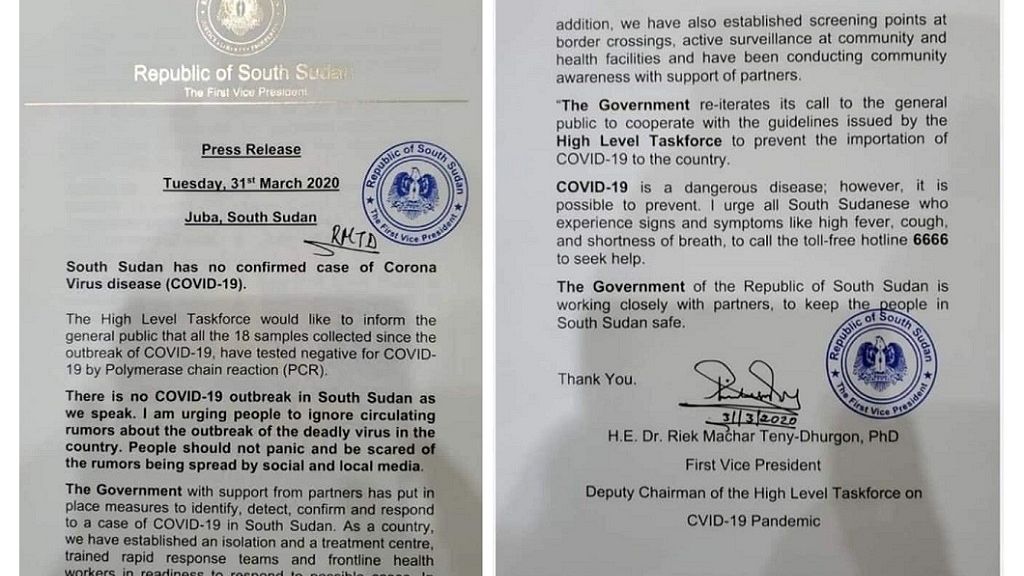
In mid-March this year, South Sudan suspended flights from countries affected by coronavirus, including Egypt and United Arab Emirates. On 25 March, President Salva Kiir issued an order imposing a night-time curfew, as part preventive measures against coronavirus. The measure started on March 26.
Interior Minister Paul Mayom Akec announced the measure stressing that the populace were expected to stay home from 8pm until 6am across South Sudan until further notice.
Akec further said health conditions requiring movements of ambulances, broadcast journalists on duty and network operators on duty would be exempted. “The order is in compliance of the republican order issued by the President for the protection of the citizens of South Sudan from the health risk of COVID-19,” he explained.




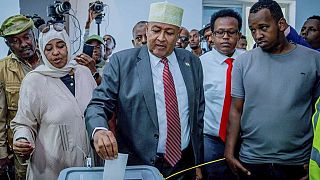
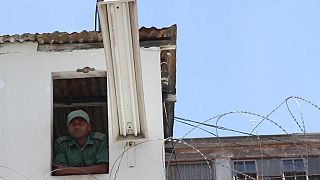
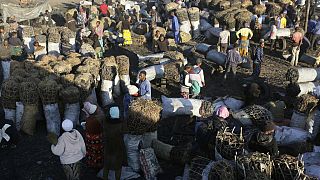
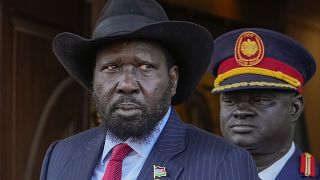
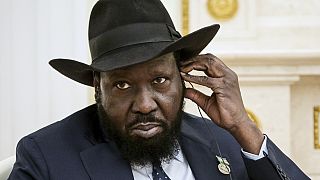
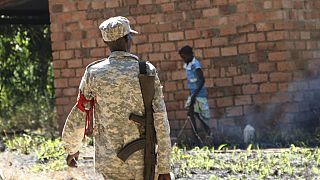
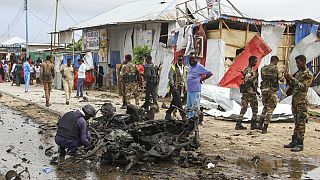
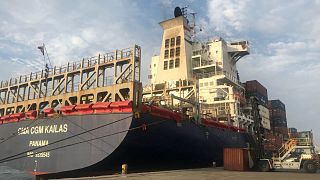
01:16
António Guterres' vision for climate justice in Africa's G20 leadership
01:12
Pope Francis Appoints 21 New Cardinals, Highlighting Global Inclusion
01:04
Urgent aid sought for Sudan's isolated regions
01:31
Palestinian children line up in Gaza Strip hoping to be distributed a warm meal
01:10
Prince William honors conservation heroes at Tusk Awards in London
01:28
Taking into account human rights is key in ending AIDS- UN report